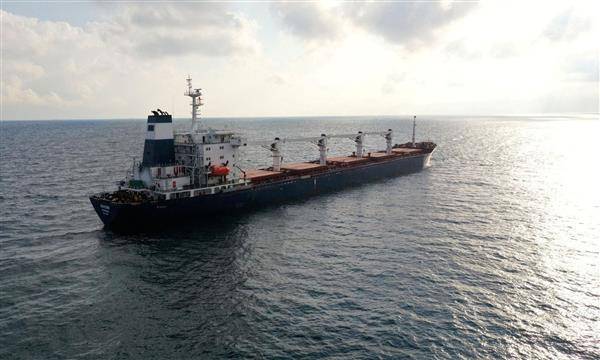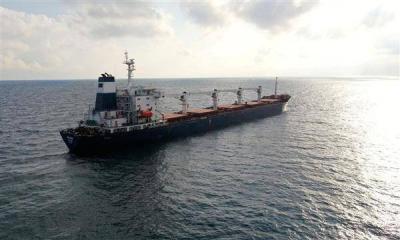Russia struck Ukrainian ports on Tuesday, a day after it withdrew from a UN-supported agreement that allowed Kyiv to export grain. Moscow announced it had made gains on the ground in an area previously reported by Ukrainian officials as being re-attacked by Russian forces. Russia stated it bombed a fuel depot in Odesa and a facility for producing maritime drones as part of "massive retaliatory strikes" in response to Ukrainian attacks that destroyed its land bridge to Crimea.
Shortly after the bridge was hit on Monday, Moscow withdrew from the grain export agreement, which had been in place for a year and facilitated by the UN, a move the international organization said risks exacerbating hunger worldwide. The Ukrainian southern military command reported that the explosions and falling debris damaged several unspecified homes and infrastructure in Odesa port, one of Ukraine's main ports. Local authorities in Mykolaiv, another port, also reported a large fire there.
Ukrainian Presidential Office Director Andriy Yermak stated that Russian attacks on the ports provide "further evidence that the terrorist state wants to jeopardize the lives of 400 million people in countries reliant on Ukrainian food exports." The Ukrainian Air Force reported it had downed six Kalibr missiles and 31 out of 36 drones. Moscow announced it had thwarted a Ukrainian drone attack on Crimea, causing no significant ground damage, and resumed limited traffic on the Crimean bridge.
After six weeks of Ukraine's counter-offensive in the east and south, Russia launched a ground attack in the northeast. The Russian Defense Ministry reported its troops advanced two kilometers around Kupiansk, a rail hub on the front line that Ukraine had regained in last year’s attack. Kyiv acknowledged the situation in the region was "complex."
Since Ukraine began its counteroffensive last month, it has regained some villages in the south and surrounding areas of the devastated city of Bakhmut in the east, but has yet to attempt significant advances through heavily fortified Russian lines. U.S. Joint Chiefs of Staff Chairman General Mark Milley stated that the Ukrainian counteroffensive was far from being described as a failure, but he anticipated a prolonged fight ahead. "I think there’s still a lot of fighting to do, and I stand by what we’ve said before: it's going to be a long, hard, bloody fight," Milley told reporters in Washington.
# Food Security Risks
The grain export agreement through the Black Sea, brokered by Turkey and the UN a year ago, was the only diplomatic success during the war, as it lifted the Russian blockade on Ukrainian ports and averted a global food emergency. Ukraine and Russia are among the world's largest exporters of grain and other food products. If Ukrainian grain does not flow back into the market, prices may rise globally, harming the poorest countries.
Several G20 members condemned Russia's move during a group meeting on Tuesday; however, India, the host of the meeting, stated it could not reach a consensus due to objections from China and Russia. Moscow rejected calls from Ukraine to allow the resumption of shipments without Russian involvement, with the Kremlin explicitly stating that vessels entering the region without its guarantees would be at risk. Kremlin spokesperson Dmitry Peskov stated, "We're talking about an area close to a war zone, without appropriate security guarantees, there will be certain risks. So if something is done officially without Russia, these risks need to be taken into account."
Russia claims it may return to the grain agreement but not before its demands for easing regulations regarding its food and fertilizer exports are met. Western countries argue this is exploiting the food supply issue to press for a reduction in financial sanctions that already allow Russia to sell food products. Ukrainian President Volodymyr Zelensky called for the continuation of the grain agreement without Russia and is making efforts to gain Turkey's support to lift the Russian blockade. Turkish President Recep Tayyip Erdoğan, the agreement's sponsor, believes he can convince Moscow to return.
Any attempt to resume Ukrainian grain exports without Russia's involvement depends on insurance companies agreeing to provide coverage. Insurance sector sources told Reuters they are considering the implications.
# Slow Counteroffensive
Russia's announcement on Tuesday of progress in Kupiansk is a rare indication that Moscow is seeking to resume its offensive since Kyiv launched its counteroffensive last month. Ukrainian Ground Forces Commander Oleksandr Syrskyi described the situation in that area as "complex but under control." Spokesperson for the forces in eastern Ukraine Serhiy Chervaty reported that the Russian army has mustered over 100,000 troops and more than 900 tanks in the region.
Both sides have suffered heavy losses in the deadliest battles in Europe since World War II, but frontline lines have only shifted slightly since last November, despite Russia’s massive winter offensive followed by Ukraine's counteroffensive. The Ukrainian counteroffensive has made limited gains near Bakhmut and along two main axes in the south, but the assault force equipped with new Western weapons and billions of dollars in ammunition has yet to confront Russia's main defensive line.
Kyiv states it is advancing slowly intentionally to avoid significant losses in fortified defensive lines scattered with landmines, focusing currently on weakening Russian command and supply lines. Moscow insists the Ukrainian counteroffensive has failed.




